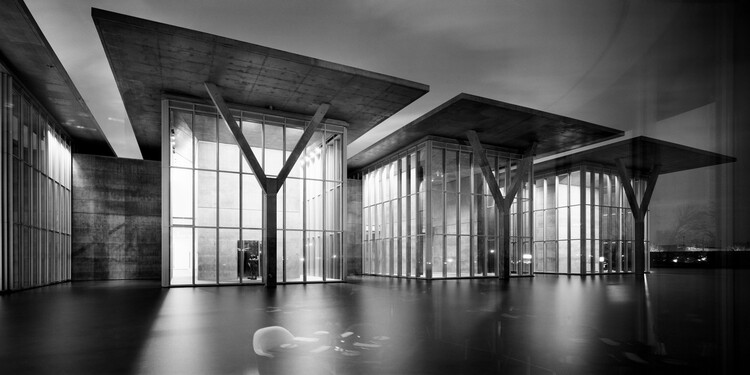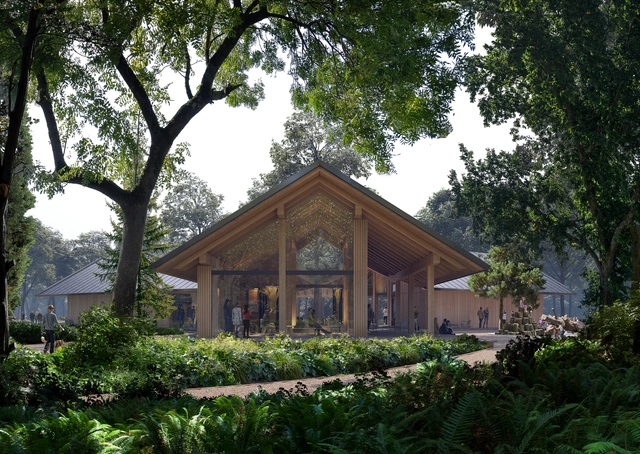D5 Render is an intuitive and effective tool for creating high-quality animations, thanks to its abundant dynamic models and fast output speed.
News
How to Make Animation Rendering Faster with D5 Render
3D-Printed Masonry Wall: The Introduction of Digital Craftsmanship

Since the 1980’s, 3D-printing has offered new ways of developing architecture, engineering, and objects of daily use. When it comes to digitizing analogue processes, it is vital for users to become familiar with current tech innovations and their benefits. HIVE Project reshapes the art and craft of building in clay by combining traditional ceramics, smart geometry, and robotic precision to construct a masonry wall composed of one hundred seventy-five unique 3D-printed clay bricks.
Generating Documentation With SketchUp
A step-by-step outline on how to turn 3D models in SketchUp into 2D documentation through LayOut.
JDS + Coldefy + Carlo Ratti Associati + NL Architects + Ensamble Studio to Renew New EU Parliament Building in Brussels

The European design team integrated by architectural firms JDS Architects, Coldefy, Carlo Ratti Associati, NL Architects, and Ensamble Studio has been announced as the winner of the international design competition for the renewal of the Paul-Henri SPAAK Building, the European Parliament plenary building in Brussels, Belgium.
Meet the Winners of Saint-Gobain’s “Architecture Student Contest” 2022

The 17th edition of the "Architecture Student Contest" has come to an end, with the participation of over 220 universities from 32 countries. This year, the challenge was to transform a district located in Warsaw, Poland in order to revitalize an area located next to Warszawa Wschodnia (Warsaw East). The contest involved the design of a new student residence and housing, as well as a meeting and entertainment center in an old factory building that is classified as a historical heritage site. With the requirement of addressing the space's performance as well as its architectural, environmental and social aspects, the contestants were tasked with a project that positively impacts its users and the planet, with low carbon emissions throughout its life cycle.
Frank Gehry's Long-Delayed Ocean Avenue Project in Santa Monica Finally Gets City Council Approval

After nine years of design changes and updates, Frank Gehry's Ocean Avenue project has finally been given the approval by the Santa Monica City Council. Initially proposed in 2013, the mixed-use development was originally conceived as as 22-story hotel and residential tower, but was shortened to 12 stories in 2018 to meet restrictions imposed by the city’s Downtown Community Plan. Construction is expected to begin shortly after receiving the complete building permits, with an official opening date set within the next three years.
Allied Works Selected to Design the Vero Beach Museum of Art Expansion and Renovation Project

The Vero Beach Museum of Art (VBMA) in Florida has announced the appointment of Allied Works Architecture to lead the expansion and renovation project. The selection process took over nine months and it entailed a line-up of 13 national architectural firms and an eventual short-list. The winning design team will be led by Allied Works founder Brad Cloepfil and Principals Chelsea Grassinger and Gabe Smith. The expansion and renovation process is expected to be completed by 2026.
Permeability Rate: Complying With Legislation and Protecting the Environment

As one of the first steps in the elaboration of an architectural project, the study of the current legislation on the ground is of paramount importance for the success of the proposal. Through calculations and restrictions, zoning laws present limits to be considered in projects that, consequently, instigate architects to think of intelligent solutions, dealing with such limitations in a practical and creative way.
These parameters are dictated by the government and aim to stop, maintain or accelerate urban growth in certain portions of cities. These are norms that establish guidelines for land occupation, delimiting the percentage of built-up area, setbacks, distances, permeability, among others.
Abandoned Modernism in Liberia and Mozambique: The Afterlives of Luxury Hotels

The luxury hotel, as an architectural typology, is distinctive. In effect, it's a self-contained community, a building that immerses the well-off visitor into their local context. Self-contained communities they might be, but these hotels are also vessels of the wider socioeconomic character of a place, where luxury living is often next door to informal settlements in the most extreme examples of social inequality.
Mycelium Materials: The Future of Growing our Homes

Fungi are almost everywhere - in the air you breathe, the soil you walk on, we eat them and yes, they do also live inside of us.
Ennead Architects and Kahler Slater Unveil Contextual Design of New Milwaukee Public Museum

Ennead Architects and Kahler Slater have unveiled the design of a new 200,000 square-foot museum building in Milwaukee, Wisconsin. Set on a 2.4 acre site in the Haymarket neighborhood, the design is based on four core principles: community, nature, education, and the preservation of the museum’s vast collections. The project is expected to break ground in late 2023 and open to the public in 2026.
New York City Bans the Construction of New Schools Near Highways

The New York City Senate and Assembly have passed the SIGH act, prohibiting the construction of new schools near major roadways. The act, named The Schools Impact by Gross Highways Act, aims to protect school-age children from air pollution. Under this law, the commissioner of education for the city will not be able to approve the plans for the construction of any new schoolhouse within 500 feet (150 meters) of a controlled-access highway unless the commissioner determines that space limitations are so severe that there is no other site to erect such new schoolhouse.
Accessible Architecture: Democratizing Design and Information

Earlier this year, I witnessed an intriguing situation. I followed, via an architect friend, the negotiation for the contracting of an architectural project for a single family home. The land owner, a public school teacher, sought professional help to build her dream home, estimated at about 60 square meters. It was a challenging terrain, with specific cutouts and a very steep topography that was compensated by the view of the city. The limited budget and the owner's history indicated that this would be the seaside version of the famous Vila Matilde House by Terra e Tuma.
Photographer Erieta Attali Explores Glass Architecture in Exhibition Held in Greek Monument

Few other materials can convey architectural atmosphere as well as the glass. A to-go choice for the modernists, due to its transparent nature, glass still holds a solid place within the material palette for architects around the globe. Such unique element is the subject of Archiving Flux / Stasis, a photographic exhibition by Erieta Attali hosted by the Greek Ministry of Culture in Casa Romana, Kos Island, Greece, set to open its doors in July 21st.
Conversation Pits Are Making a Comeback

With all of the strange residential interior design trends that are making a comeback, conversation pits are probably one that you wouldn’t expect. This well-known 1970s design feature feels both very retro and modern, providing a comfortable place to lounge and a complete escape from the distractions of television and cinema. Instead of a design that supports and enhances a digital connection, having a large area to sit, and quite literally conversate, might be the space that we all need.
15 Contemporary Projects that Emphasize the Sounds of Nature

Finnish architect Juhani Pallasmaa once said that "architecture is essentially an extension of nature into the man-made realm, providing the ground for perception and the horizon of experiencing and understanding the world."
In the constant hustle and bustle of the modern surroundings, it is more than needed to take a step back and listen to the sounds of something as calmly powerful as nature. Moreover, listening to the beautiful harmonies created by birds chirping and sound waves can make our inner voice louder as well.
Aires Mateus' Light-Sculpted Arts and Photography Museum in Lausanne Captured by Paul Clemence

Following five years of construction, Portuguese architecture firm Aires Mateus has completed its awaited mudac: museum of Contemporary Design and Applied Arts in Lausanne, Switzerland. The sculptural building is part of a new cultural district and urban regeneration plan promoted by the Canton of Vaud, the City of Lausanne, and the CFF (Swiss Federal Railways), which features three art museums that translate the memory of the site, echoing its former industrial status with prismatic geometric forms, concrete surfaces, and sharp lines.
During his latest esplanade in Switzerland, architectural photographer Paul Clemence captured the newly inaugurated museum, highlighting its unique concrete geometry, play of shadow and light, and how the architecture complements its surroundings.
Powerhouse Company and Delva Create a Gateway to a New National Park in The Hague, Netherlands

Powerhouse Company, in collaboration with landscape architecture office DELVA, has unveiled the design for a new visitor center for the Koekamp, which will play an essential role as a gateway to the new Hollandse Duinen national park. This intervention will open part of Koekamp, a green expanse near The Hague’s Central Station, to the public. The visitor center, commissioned by the Dutch forestry commission, is expected to be completed in 2024.
Finishing Off Floors: Understand What Thresholds Are and What They Are Used For

The threshold is a constructive element of the floor that serves to finish when there is a notable change in material or level. Much more prominent in the past, the piece today has a more discreet presence in architecture.
The thresholds and transition strips are applied directly to the floor and are responsible for making the transition when there is any change in the built space, whether it is in level, in the type of floor, or even when there is a door or passage.
A Floating Pavilion in Slovenia and a Bicycle Route through the Tree-Tops in Italy: 10 Unbuilt Public Space Projects Submitted to ArchDaily

One of the central responsibilities of urban planners and designers is to create places within the city for gatherings, demonstrations, leisure, and relaxation. The following list of unbuilt public spaces presents projects that expand these spaces beyond the shores or riverfronts, return misused spaces back to the local communities and seek to optimize otherwise overlooked areas. These types of interventions are essential in improving the quality of life of the citizens and in making cities more enjoyable to live in.
This week's curated selection of Best Unbuilt Architecture highlights projects submitted by the ArchDaily community. Located near a UNESCO heritage site in Italy, on top of an illegal dumping site in Dallas, Texas, or in a medieval city in northern Spain, this round-up of unbuilt projects showcases how architects and urban planners recognize the potential of urban places.
Can We Eat Buildings? Thoughts About Edible Buildings Made of Earth

The use of earth-based materials appears in two practices throughout history: in the construction of buildings and – far less commonly known or conclusively understood – in certain dietary consumption patterns. To put it simply – soil, the most important nutrient collector on earth, can be used for both building and for eating.











































































